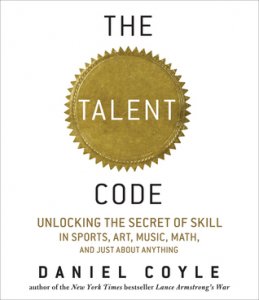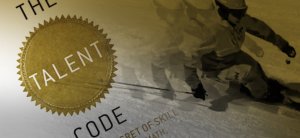 I just finished reading The Talent Code, by Dan Coyle. This is a nice, fairly easy read that challenges the widely considered notion that talent is innate and those that have it have been given a special gift, leaving the rest of us to struggle somewhat pointlessly toward different levels of skill with little hope of improving beyond "what God gave ya." The book touches on light doses of neuroscience, statistical research, kinesiology, and learning environments but does not get bogged down by them. I believe Coyle was very deliberate in doing this.
I just finished reading The Talent Code, by Dan Coyle. This is a nice, fairly easy read that challenges the widely considered notion that talent is innate and those that have it have been given a special gift, leaving the rest of us to struggle somewhat pointlessly toward different levels of skill with little hope of improving beyond "what God gave ya." The book touches on light doses of neuroscience, statistical research, kinesiology, and learning environments but does not get bogged down by them. I believe Coyle was very deliberate in doing this.In the book, we hear terms such as "deep practice," "perfect practice makes perfect," "10,000 hours and 10 years to mastery," "hotbeds of talent," and other insightful terms that are clearly explained and quite honestly inspirational. I like the notion that skills can be acquired through determined practice, repetition, and automatization. It brings focus to why our skills through behaviors and practices and outside influences have been, are, or will be successful or not.
Coyle states that deep learning includes moments of failure. This should be embraced and worked through (guided and self) to achieve strong and lasting skill acquisition. We need to understand, though, that whatever we are working on must be repeated over and over until it becomes second nature, then we will be able to build on our new skill level, and so on and so on.
Coyle touches on new and fascinating research regarding neural pathways and how they are formed to create skill. Pathways are insulated by a chemical called myelin: the more myelin that wraps around a newly forming pathway, the better the skill retention. The more intensely you practice, the thicker the myelin. The thicker the myelin, the faster the signal can travel ....
The book is separated into parts that take us along on Coyle’s real-life investigation where he travels around the world to examine talent hotbeds. These are little areas where superstars are found in great abundance. Coyle wants to know why and shares his experiences. Social, economical, political, and inspirational formulas need to be just right for a hotbed to be created and to thrive in the long term.
In Part 1 of the book, he examines the type of deep practice required for the successful, long-lasting improvement that leads to mastery. In Part 2, he looks at the importance of igniting a deep passion for the motivational process needed to sustain useful practice methods and procedures. Part 3 discusses the role of mentors. All three parts are very intriguing and add up to a comprehensive outline for achieving greatness in any discipline.
I enjoyed and was inspired by The Talent Code. It offers nice inspirational understanding on how to achieve breakthroughs toward greater skills and success. It also gives insight to why we sometimes seem to plateau. True skill acquisition does take great energy, intense, prolonged practice, and focused determination to really build on skill. It also takes time. Ya gotta want it! For me, there were only a few minor issues with slightly obvious or contrived comparisons to prove a point, but I easily saw past them.
Thanks for reading. Please feel free to fill in any blanks or misinterpretations. Should you choose to read the book, I hope you find it very useful. It is available in print or online in a PDF version.
thanks all,
JP
